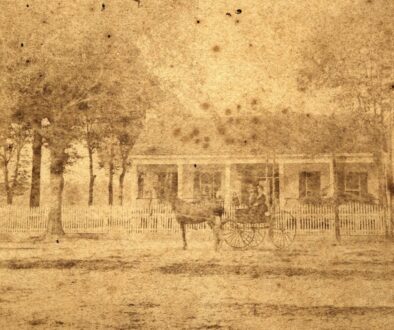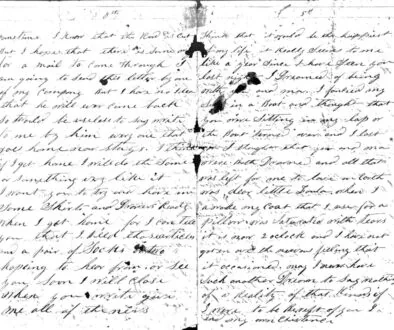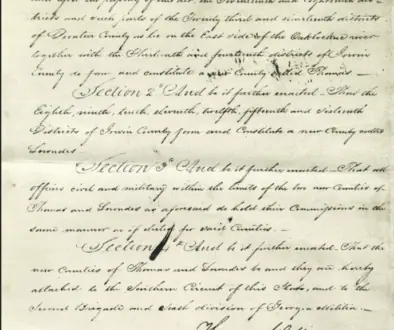Problems with Peter: The Peter Dekle Letters; Sickness
Problems with Peter: The Peter Dekle Letters
Here at the History Center, we like to supply our collections department interns and volunteers with interesting projects that illustrate what life in Thomas County’s past was like for her citizens. We have many letters, records, diaries, and documents that give sneak peeks into the daily lives of people who were more like us than we may realize.
One of our interns, Kayla Reeves (who recently attained her bachelor’s degree in history from Florida State University), was tasked with transcribing a collection of letters from Private Peter Dekle (1836-1863) to his wife Susan Dunbar Dekle (1839-?) of Thomasville. Peter’s letters span from April of 1862 to August of 1863 when he served in the Confederate Army in Company F of the 29th Infantry. For most of his military service, Peter was stationed around Savannah but was later sent to North Carolina and Mississippi before he was wounded at the Battle of Chickamauga. After several months, he succumbed to his injuries; however, the whereabouts of Susan following her husband’s death are currently unknown.
Here’s what Kayla had to say about Peter and his letters to Susan:
“As a drafted soldier, Peter did not generally discuss ideological reasons behind the war in his letters, rarely mentioning secession or even regional animosity. However, Peter’s letters provide valuable insight into the experiences and mentality of an average soldier, demonstrating themes of homesickness, despair, adventure, and adjusting to the general monotony of camp life.”
In this blog series, Kayla explores some of these themes with excerpts from Peter’s letters. Please keep in mind that Peter was writing in the language and attitudes of his time which we now consider to be racist and prejudice.
Sickness
In his letter from July 25, 1862, Peter described the diseases and poor health that plagued the military camps stating,
“there a great deal of sickness in our regiment. they have bin three deaths in less than a weeke. they were two departed this life last knight [night] with the tipoid fevour [typhoid fever].” [1980.04.06].
Typhoid Fever was common throughout Civil War camps on both the Union and Confederate sides. Now rare in the United States, the Salmonella typhi bacteria acts similarly to the salmonella bacteria responsible for food poisoning but in a significantly more intense manner leading to extreme dehydration and nutrient depletion. With cramped living quarters and negligent hygiene practices in the camp, it’s not surprising that Peter reported three deaths in such a short time frame. He goes on to say,
“and they are a great many more down in the hars pittle [hospital] are very dangerously sick which I do not think they will heardly [hardly] live until sunday, and they are still goin [to] the horspittle [hospital] sick ever day, threw the lords will I never injoyed [enjoyed] better health in all my life.” [1980.04.06].
Most deaths throughout the Civil War were caused by disease rather than injury on the battlefield. This fact held true for the men of Thomas County who fought in the War. Records show that many of them died of diseases picked up in camp rather than being killed in battle. At the end of his paragraph, Peter commented on his good fortune in staying healthy amidst the outbreak in his camp. Unfortunately for Peter, it would not be long before his turn to be ill would come around.
In a letter home from September 6, 1862, Peter complained of feeling ill and suffering from an unknown disease, stating,
“I am not very well at this time. I have bin [been] a little sick ever since I were at home my throat are swolen up as though as I had the momphs [mumps]. it pains me wors [worse] than any swelling I ever had. it hurts wors [worse] at knight [night] than any other time though I keepe up all the time have not kept my bed for it one hour,” 1980.04.14.
While it is impossible to confidently say what Peter was suffering from, he clearly suffered greatly from it. Despite his great pain and discomfort, Peter retains a sense of hope about his situation and the possibility he could use it as his ticket home. He continues,
“you need not be oneasey [uneasy] about me for if I get dangerously sick I will come home on a sick furlow [furlough] for if it are tonsaletos [tonsillitis] it will be no trouble at all for me to get off home so make your self easy. I am not dangerous,” 1980.04.14.
Peter’s desperation to go home outweighed his fear of dying from disease. About 705 men from Thomas County fought in the 29th and 57th Georgia Regiments. Of that number, 275 died during the War, most from disease. That’s a 39% loss in the number of men sent off – a sobering fact in the light of modern medical advancements that have answers for many of those deadly diseases.




